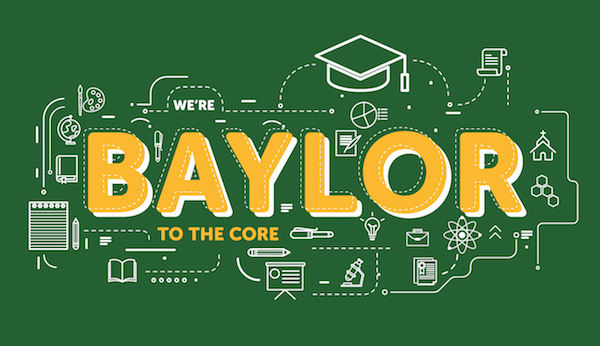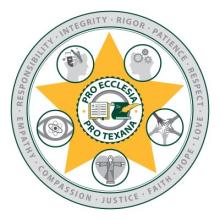Core Curriculum Newsletter
Core Faculty Newsletter
SUMMER 2023 EDITION
Dear Colleagues,
Happy August 2023! The philosopher Sam Keen said, “Deep summer is when laziness finds respectability.” Unfortunately, for those of us who teach kindergarteners or graduate students, or any level of students in between, when we get deep into the summer, school starts with a bang! I hope you had some leisure weeks in June or July, at least.
You’re receiving the Core Faculty Newsletter: Summer Edition because you are one of approximately 400 instructors offering a course included in the core curriculum this Fall 2023 semester. Some of you are veteran professors of your core class, while others may be offering your first course in the core, which may even be your first course at Baylor. Either way, I hope you find the information in this newsletter beneficial as you finalize your syllabi and class plan for the fall.
For more information on the core curriculum, including the Core vision statement, descriptions of the required course objectives for Common courses and Distribution Lists, and a plan for Core assessment and faculty resources, visit our Core Curriculum website.
Sincerely,
Blake Burleson, Ph.D.
Associate Dean for Undergraduate Studies, Core Curriculum & Strategic-Enrollment Initiatives
College of Arts & Sciences
Frequently Asked Questions
What is the A&S Core Curriculum?
The College of Arts & Sciences core curriculum is the foundation for any degree from Baylor University, and a central component of the University’s central pillar of Transformational Undergraduate Education with its aim to educate men and women to become informed and productive citizens of a democracy and servant leaders of faith communities. For this reason, the A&S maintains a robust core curriculum across diverse academic disciplines such as the sciences, social sciences, humanities, and fine arts. As a result, students graduating from Baylor will be characterized by independent intellectual perspectives informed and supported by the depth and breadth of the liberal arts tradition. The core curriculum, taught within a community of Christian scholars, enables men and women to acquire the knowledge, skills, and virtues needed to uncover and recognize truth, deepen their faith, live virtuously, strengthen their communities, and affect the world in transformative ways. You can access the A&S core curriculum Vision Statement on the A&S core curriculum website.
What does it mean that my course is included in the A&S Core Curriculum?
The core curriculum of the College of Arts & Sciences comprises five common courses and nine distribution lists (DL). Each Common Course and DL has an Official Core Document that provides the details required of that course or DL (including the course description and course objectives). If your course is included in the core curriculum (whether a common course or a course within a distribution list), it should include the title, description, and objectives outlined in the Official Core Document for your common course or distribution list. The Official Core Document for common courses and the Official Core Document for distribution lists can be found on the A&S core curriculum website.
How can I make sure my syllabus reflects the approved core requirements?
The A&S Dean’s Office has created a core course syllabus checklist for you, available on the core curriculum website, under the Faculty tab.
What resources are available to faculty teaching in the A&S core curriculum?
Please access the faculty tab on the core curriculum website, which provides information about teaching a core class. Use the navigation menu within the Teaching Resources page to explore the different types of resources available.
Resources Include:
- Assessment Rubrics & Resources on Shared Knowledge, Skills, and Virtues
- A&S Course Design, including suggested syllabus language and course descriptions
- A&S Core Course Syllabus Checklist
- The Academy for Teaching & Learning’s Course Design and Planning Resource page
- The Academy for Teaching & Learning’s Syllabus Construction Resource page
- The Center for Academic Success and Engagement’s Faculty/Staff Resources page
- Teaching Core Virtues Resources page
- Information on the Common Course readers
- A Shared Foundation of Knowledge: a report on what students are reading in the Common Core Courses.
How will my course be assessed as a part of the A&S core curriculum?
The A&S Dean’s Office, in conjunction with the Core Curriculum Advisory Committee (CCAC), created the Core Curriculum Assessment Plan. The plan includes seven areas of analysis, two of which relate to assessing student learning within a core curriculum course and core course adherence to CCAC guidelines and course requirements. What this means for you teaching a course in the core curriculum is:
- Your department chair or undergraduate program director (UPD) may reach out to you to discuss the information they may need to complete the Curriculum Assessment Report on Learning Objectives (CARLO) form, which is required of departments every three years for each course taught in the core curriculum.
- The A&S Dean’s Office will ask you to complete a Syllabus Self-Assessment (SSA) for each course you are teaching in the fall or spring semester. Faculty who have previously submitted an SSA for a course in Spring 2023 will not need to submit another one for the 2023-2024 academic year. The information gathered by the SSA goes directly to the A&S Dean’s Office. Names and specific data shared are only viewable to the Associate Dean for Undergraduate Studies, Core Curriculum and Strategic-Enrollment Initiatives. The A&S Dean, CCAC, department chairs, and undergraduate program directors will receive an annual report with anonymous, aggregated data at the common course or distribution list level. Names of Teachers of Record and other identifying markers are removed from the report. While recognizing that a syllabus is not a comprehensive analysis of the contents of a course, the self-assessment is a useful tool to help faculty members know the approved guidelines for their particular core course. Assessment based on the syllabi will not be punitive, and all reports to the dean or chairs will be anonymous.
The most recent comprehensive Core Curriculum Syllabus Self-Assessment Report is available within the faculty tab on the core curriculum website.
Who do I contact if I have additional questions about the A&S core curriculum?
Please contact Blake Burleson.


